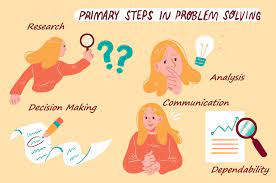Problem Solving Skills Examples
Problem solving skills are essential in both personal and professional life. Employers highly value individuals who can effectively identify, analyse, and solve problems. Here are some examples of problem solving skills in action:
Critical Thinking
Being able to think critically is a key problem-solving skill. This involves evaluating information, identifying patterns, and making logical connections to come up with solutions.
Decision Making
Good decision-making skills involve weighing the pros and cons of different options, considering potential outcomes, and choosing the best course of action.
Creativity
Thinking outside the box and coming up with innovative solutions is another important problem-solving skill. Creativity allows you to approach problems from different angles and find unique answers.
Analytical Skills
Analytical skills involve breaking down complex problems into smaller components, examining each part closely, and understanding how they relate to each other. This helps in finding the root cause of an issue.
Communication
Effective communication is crucial when solving problems, especially in a team setting. Being able to clearly articulate your thoughts, listen actively to others, and collaborate efficiently can lead to successful problem resolution.
By developing and honing these problem-solving skills, you can become a valuable asset in any situation that requires critical thinking and innovative solutions.
Seven Effective Strategies for Enhancing Your Problem-Solving Skills
- Identify the root cause of the problem before attempting to solve it.
- Break down complex problems into smaller, manageable parts.
- Think creatively and consider all possible solutions, even unconventional ones.
- Seek input and perspectives from others to gain new insights and ideas.
- Set specific goals and deadlines to track progress and stay focused.
- Learn from past mistakes and use them as opportunities for growth.
- Stay positive and resilient in the face of challenges, maintaining a problem-solving mindset.
Identify the root cause of the problem before attempting to solve it.
When it comes to problem-solving skills, a crucial tip is to identify the root cause of the issue before attempting to solve it. By pinpointing the underlying source of the problem, you can address it effectively and prevent similar issues from arising in the future. Taking the time to understand what is causing the problem allows for a more targeted and sustainable solution, leading to better outcomes and long-term success. This approach not only saves time and effort but also ensures that you are tackling the problem at its core, making your problem-solving efforts more efficient and effective.
Break down complex problems into smaller, manageable parts.
When faced with complex problems, a useful tip for improving problem-solving skills is to break them down into smaller, more manageable parts. By deconstructing a large issue into smaller components, it becomes easier to analyse and address each part individually. This approach allows for a more systematic and organised method of problem solving, making it less overwhelming and more achievable. Breaking down complex problems into smaller parts helps in identifying key areas that need attention, leading to effective problem resolution and a clearer path towards finding solutions.
Think creatively and consider all possible solutions, even unconventional ones.
When honing problem-solving skills, it is crucial to think creatively and explore all potential solutions, even those that may seem unconventional. By embracing creativity and open-mindedness, individuals can uncover innovative approaches to tackling challenges that traditional methods may overlook. Considering a diverse range of solutions not only broadens one’s problem-solving capabilities but also encourages thinking outside the box to find effective and unique answers.
Seek input and perspectives from others to gain new insights and ideas.
Seeking input and perspectives from others is a valuable strategy when it comes to enhancing problem-solving skills. By actively listening to different viewpoints and ideas, individuals can gain new insights and approaches that they may not have considered on their own. Collaborating with others not only broadens the scope of possible solutions but also fosters a sense of teamwork and shared responsibility in overcoming challenges. Embracing diverse perspectives can lead to more creative and effective problem-solving outcomes, making it an essential skill for personal and professional growth.
Set specific goals and deadlines to track progress and stay focused.
Setting specific goals and deadlines is a crucial tip for enhancing problem-solving skills. By clearly defining what needs to be achieved and establishing a timeline for completion, individuals can track their progress effectively and maintain focus on the task at hand. This approach not only helps in breaking down complex problems into manageable steps but also provides a sense of direction and urgency, motivating individuals to work towards finding solutions efficiently. Setting goals and deadlines encourages accountability and ensures that efforts are aligned towards achieving the desired outcomes, making problem-solving more structured and effective.
Learn from past mistakes and use them as opportunities for growth.
Learning from past mistakes and using them as opportunities for growth is a valuable tip for enhancing problem-solving skills. By reflecting on previous errors or challenges, individuals can identify what went wrong, understand why it happened, and determine how to avoid similar pitfalls in the future. Embracing mistakes as learning experiences fosters personal development and resilience, ultimately leading to more effective problem-solving strategies. This approach encourages individuals to adapt, improve, and evolve in their problem-solving capabilities, turning setbacks into stepping stones towards success.
Stay positive and resilient in the face of challenges, maintaining a problem-solving mindset.
When faced with challenges, it is crucial to stay positive and resilient while maintaining a problem-solving mindset. By approaching obstacles with optimism and determination, individuals can effectively navigate through difficulties and find creative solutions. Positivity not only helps in maintaining motivation but also fosters a sense of confidence in one’s ability to overcome hurdles. Resilience allows individuals to bounce back from setbacks, learn from failures, and adapt their problem-solving strategies accordingly. Embracing a positive and resilient attitude is key to tackling challenges head-on and achieving successful outcomes.

Leave a Reply